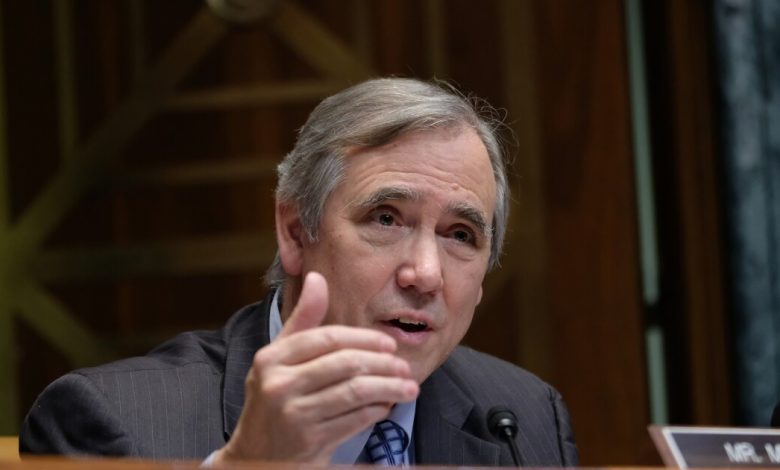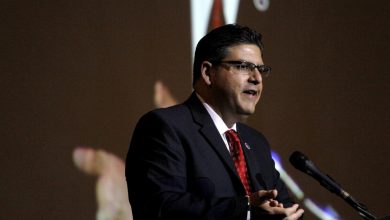Why 2 Federal Lawmakers Decided to Target Legacy Admissions

As colleges face calls to become more inclusive, one refrain has grown in popularity in recent years. Why not ban legacy admissions? By giving a boost to the children of alumni, critics charge, the practice only adds an additional barrier for the underrepresented students striving to navigate higher education.
On Capitol Hill, two Democratic lawmakers this month unveiled legislation to outlaw legacy preferences in admissions on many campuses. The bill’s passage is unlikely, at least for now, but its introduction signals how prominent a target legacy admissions has become in progressive circles.
Sen. Jeff Merkley, of Oregon, and Rep. Jamaal Bowman, of New York, say the bill is a sure-fire way to make the college-admissions process more equitable. “Every child … regardless of what community they live in, who is a focused individual wanting to explore the world and has worked hard in high school, should have a fair chance to apply and not have 10 or 25 percent of the seats set aside that are pre-allocated to the most privileged individuals,” Senator Merkley said in an interview with The Chronicle.
It never occurred to anyone around me to visit the campus, because who would have the money to go to another state?
Legacy policies vary by campus, and exact data on how many students benefit from legacy status is difficult to find. A recent Associated Press report found that at very selective colleges, 10 percent to 20 percent of incoming classes are made up of students with family ties to graduates.
Merkley, who was the first person in his family to attend college, recalled being bewildered when he arrived at Stanford University and learned that he was the only person in his dorm who hadn’t visited the campus before he enrolled.
“It never occurred to anyone around me to visit the campus, because who would have the money to go to another state?” said Merkley, who grew up in a blue-collar community in Oregon. “This is an example of how students who do not come from a background where college is discussed really are a long way from understanding the possibilities — how to apply, where to apply, and so forth.”
He says banning legacy admissions would be one step toward reducing the built-in advantages enjoyed by privileged students.
The Fair College Admissions for Students Act would require campuses that receive federal financial aid to ban legacy preferences from their admission policies. But it also creates a carve-out, giving the U.S. secretary of education the power to waive the ban for historically Black colleges and universities, tribal colleges, and minority-serving institutions. Universities could be exempted by submitting a waiver each year showing that use of a legacy preference helps historically underrepresented students get into those colleges.
In a statement, Representative Bowman said it’s important that principles of equity be enshrined in colleges’ policies. “We have to ensure our policies reflect equity and inclusion — including at our institutions of higher education. The legacy admissions practice, which disproportionately benefits rich, white, and connected students, and has anti-Semitic and anti-immigrant roots, creates another systemic barrier to accessing higher education for low-income students, students of color, and first-generation students,” he said.
But some experts have argued that ending legacy admissions would do little to improve diversity at colleges or improve lower-income students’ chances of being admitted. Catharine B. Hill, managing director of the consulting group Ithaka S+R, has argued in The Chronicle that selective colleges’ reliance on tuition and demonstrated preference for admitting wealthier students would be unaffected by a legacy ban.
But Senator Merkley said that even if such a ban wasn’t a silver bullet, it would still make a difference for some students.
“Maybe in the process of striking down the formalized systemic discrimination in favor of the privileged, maybe it will make the entire team at a college that thinks about how they review student applications more thoughtful about whether they also have nonformalized biases that they need to wrestle to address,” he said.
Public opinion has begun to swing against legacy admissions. The affirmative-action case involving Harvard University and the University of North Carolina at Chapel and the 2019 Operation Varsity Blues scandal have drawn attention to allegations of bias in admissions.
“That really opened people’s eyes and exposed how inequitable the higher-education admissions process is to a lot of folks,” said Viet Andy Nguyen, founder of the nonprofit organization EdMoblizer, which urges an end to legacy admissions. “I think it made people much more willing to reassess the practices that have been accepted as the norm for the past few centuries.”
Some colleges, including the Johns Hopkins University and Amherst College, have responded by eliminating legacy preferences. Hopkins’s president wrote, in an op-ed in The Atlantic, that the step improved diversity in his institution’s student body by increasing the number of Pell Grant-eligible students while reducing those with legacy connections.
Colorado became the first state to ban legacy admissions at public universities in 2021. Connecticut’s legislature is considering a similar policy, and California passed a law in 2019 that requires colleges to disclose whether their admissions process favors legacy students.
Nguyen said he’s encouraged by the fact that even those who stand to benefit from legacy admissions are starting to oppose the practice in greater numbers. More than 1,000 alumni and students from over 30 different universities have signed onto an effort by EdMoblizer, pledging not to donate to colleges that consider legacy in admissions.
“I think the alumni, the students have a lot more say in how universities think about their policies than people realize,” Nguyen said. “Theoretically, alumni and students have an incentive to not speak up. They are doing so and saying that, ‘even though we benefit from this practice, we are rejecting it in the name of broader equity for society.”
Source link






